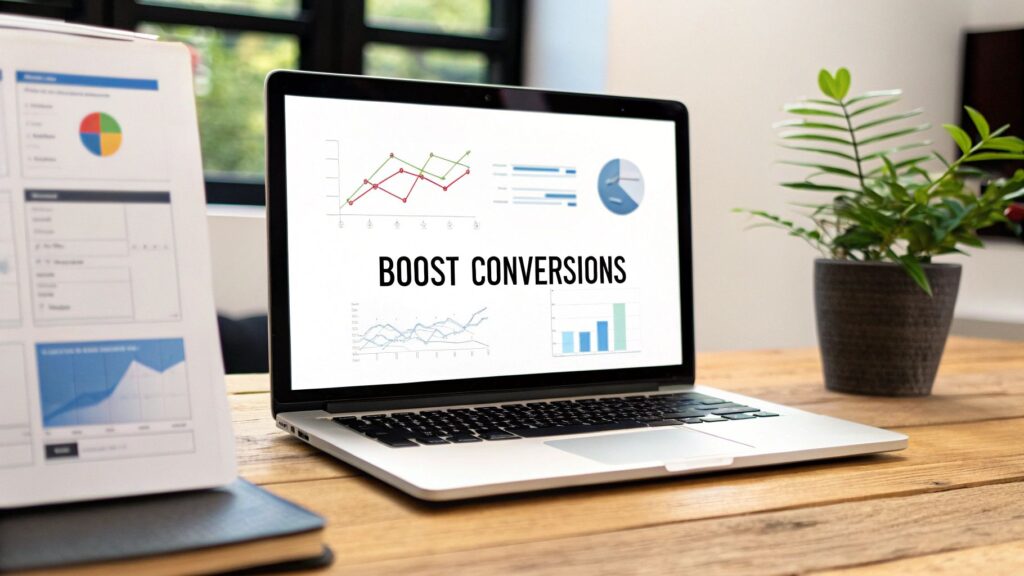When a pipe bursts at 2 AM, homeowners aren't sifting through junk mail. They're on their phones, searching for immediate help. This is where SEO for water damage restoration isn't just marketing—it's your lifeline, connecting you to customers in crisis.
In Short: Good SEO gets your company found online during a water emergency, leading directly to more calls and jobs.
Why SEO Is Your Best 24/7 Salesperson
Let's be clear. Your business succeeds based on how visible you are during an emergency. You can have the best team and equipment, but if a homeowner with a flooded living room can't find you on Google, you don't exist to them.
A solid SEO strategy is your digital emergency response system.
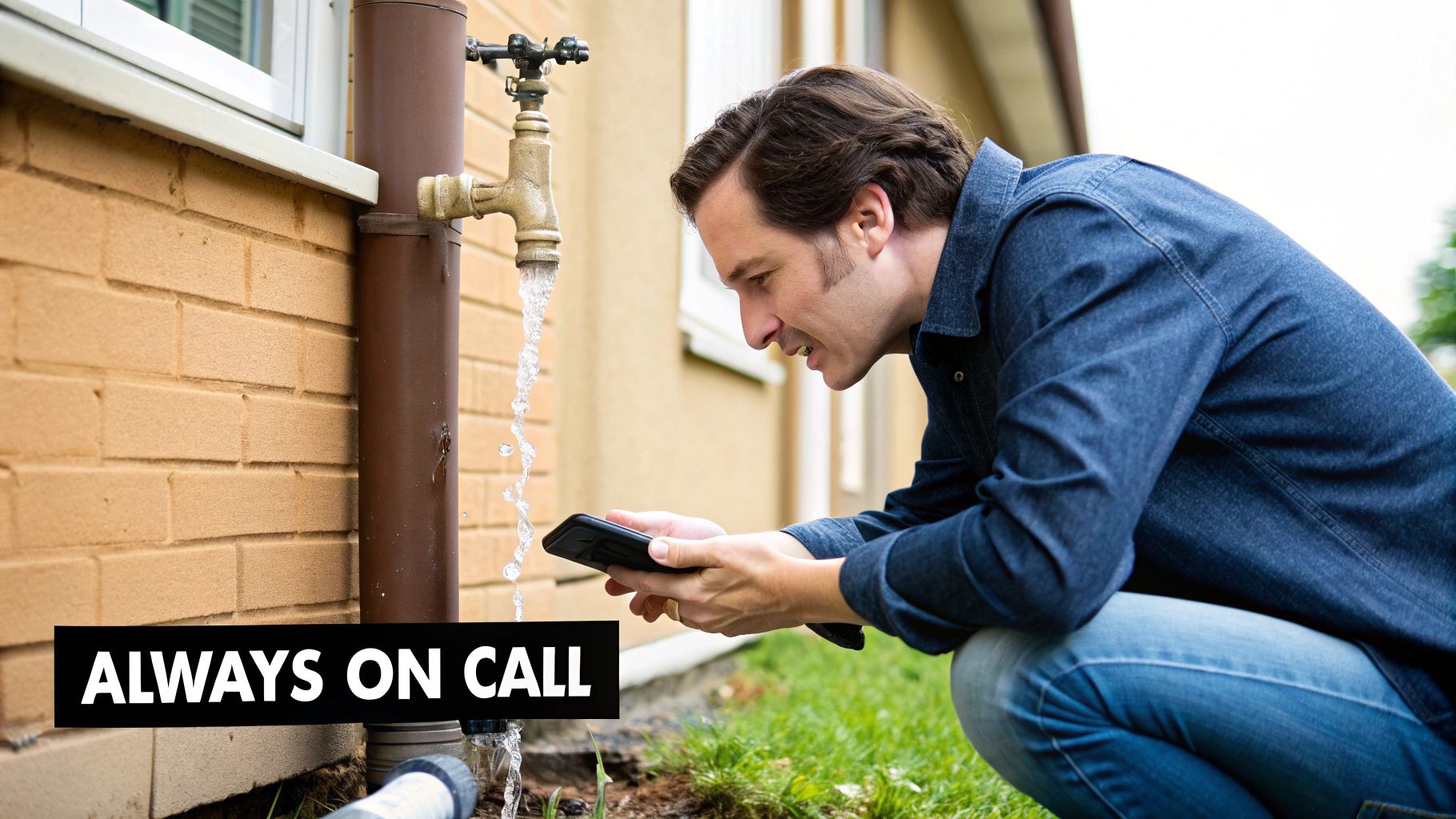
Unlike a radio ad that runs from 9 to 5, SEO works around the clock. It puts your business front and center when someone searches "emergency water extraction near me," even on a holiday weekend.
Connecting With Customers in Crisis
In this industry, trust and speed are everything. Ranking at the top of Google is a shortcut to building that trust. When a potential customer sees your company in the top three local results, it signals you are a legitimate, available expert.
That digital authority is what turns a desperate search into a phone call.
The bottom line: SEO places your business in the path of people with urgent problems who are ready to hire immediately. It's the most direct line to your ideal customer.
The restoration market is fragmented—no single company owns more than 5% of the market share. A powerful digital presence is one of the only ways to stand out. More than half of restoration companies now depend on web leads and high search rankings, showing a big shift to a digital-first approach.
Decoding an Emergency Search
Here’s what a customer does during a water crisis and how SEO meets their needs.
| What the Customer Does | What They Need Instantly | Your Winning SEO Tactic |
|---|---|---|
| Pulls out their phone and types "water damage repair near me." | A phone number they can call right now. | Your Google Business Profile is optimized with a clickable phone number. |
| Scans the first few search results for credibility. | Proof that you are a real, local business. | High star ratings and recent, positive reviews show you're trusted. |
| Clicks on a top-ranking website to see if you can help. | Confirmation you handle their specific problem (e.g., sewage backup, burst pipe). | Your website has clear service pages optimized for these exact keywords. |
| Looks for a sign that you can be there fast. | A clear statement of 24/7 emergency service. | Your homepage and title tags feature "24/7 Emergency Service" prominently. |
Seeing these elements in the first few seconds of a search convinces a panicked homeowner to call you.
Turning Your Website into a Lead Machine
A properly optimized website generates business. Every part of your online presence, from service pages to your Google Business Profile, works to capture leads. The goal of SEO is to make your phone ring. We’ve covered how SEO drives phone sales in a separate guide.
You can also check out these effective construction marketing tips. The principles of building trust are similar. Investing in SEO for your water damage company builds a reliable system that brings you emergency jobs.
Your Google Business Profile Is Your Digital Storefront
When a basement is flooding, homeowners aren't browsing. They are on their phones, typing “water damage repair near me,” and calling the first trustworthy company in the Google Maps results.
Your Google Business Profile (GBP) is your digital storefront and your most powerful tool for getting high-value calls. Getting this right is critical for any SEO for water damage restoration plan.
A well-tuned profile can make your phone ring before a customer even clicks on your website.
Nailing the Foundational Details
Let’s start with the basics, where many companies make mistakes. Your core information must be perfect.
- Business Name: Use your exact business name. Don't add keywords like "Springfield Water Damage Experts." Google may penalize you for it.
- Categories: This is essential. Your primary category must be "Water Damage Restoration Service." Add secondary categories like "Sewage cleanup service" or "Fire damage restoration service" if you offer them.
- Service Area: Be specific. List the actual cities, towns, and zip codes you serve. This helps you appear in local emergency searches.
Key Takeaway: Your Name, Address, and Phone number (NAP) are the foundation of your local SEO. Inconsistent NAP is like a cracked foundation for your business's online presence.
Answering Questions Before They're Asked
The Q&A section on your GBP is a goldmine for building trust, but most competitors ignore it. You should be the first one to ask and answer questions here. Think like a panicked homeowner.
- "Are you open 24/7 for emergencies?"
- "Do you work directly with insurance companies?"
- "How fast can you get a team to my house in [Your Town]?"
Answering these questions upfront shows you understand their urgency. This simple tactic puts you ahead of the competition. To learn more, read these tips on how to optimize your Google Business Profile for local growth.
This infographic shows how these elements work together.
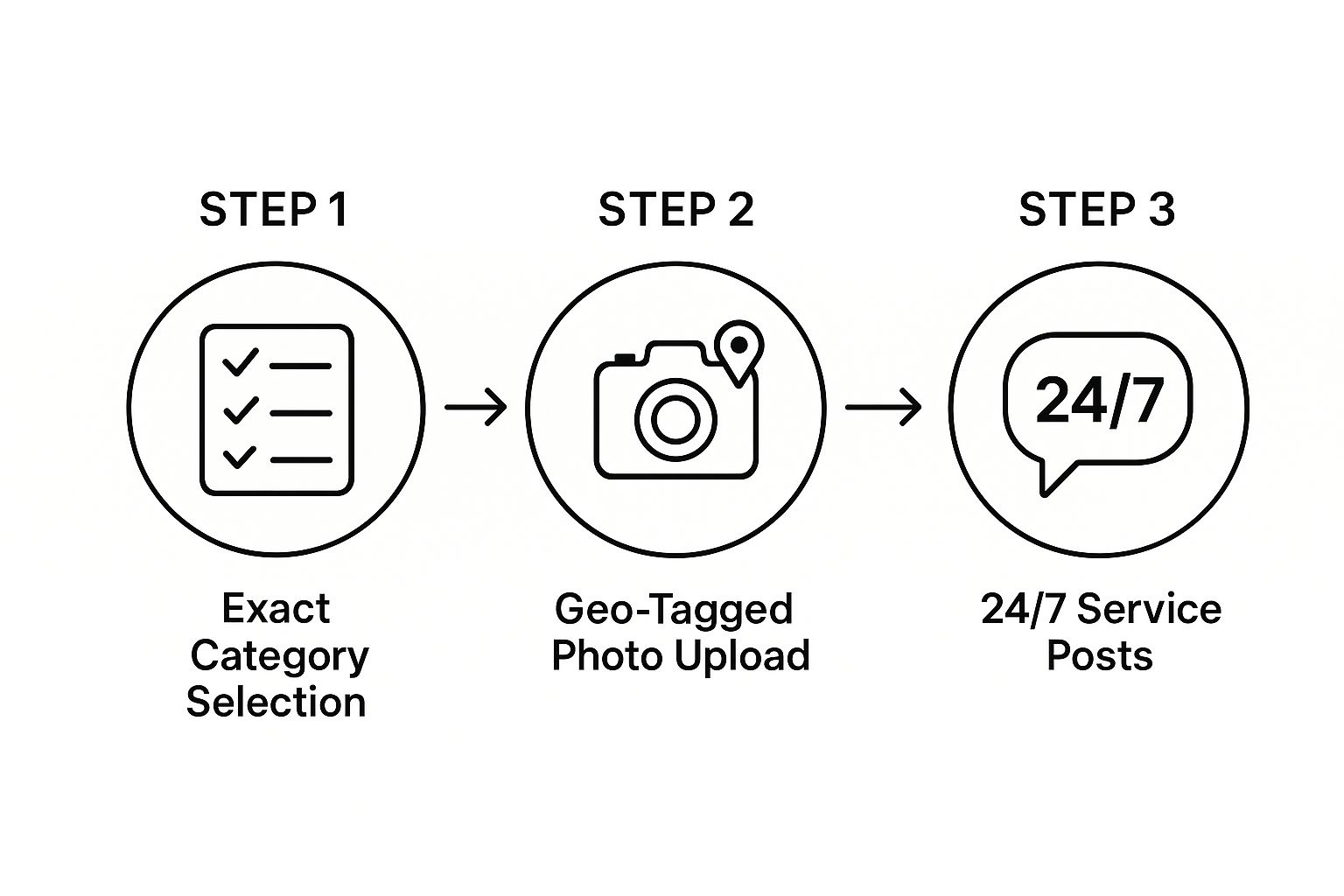
As you can see, it’s a cycle: the right category gets you seen, real photos prove you're legit, and clear communication seals the deal.
Using Photos and Posts to Build Instant Trust
Stock photos don't work. Your photos are proof you are a real, professional, local company.
Upload plenty of high-quality, geo-tagged photos showing your team, branded trucks, and equipment at a job site. This visual proof builds more trust than text ever could.
Google Business Posts are another underused tool. They are like free mini-ads in your search listing.
Here are a few post ideas:
- Emergency Availability: "Flooded Home? We're on call 24/7. Call Us Now for Immediate Dispatch."
- Service Spotlight: "Just handled a major sewage backup in [Town Name]. Our team is equipped for the toughest jobs."
- Recent Work: With permission, post a before-and-after shot of a recent job.
Regular posts signal to Google that your business is active. More importantly, they give customers another reason to call you.
Find Keywords That Make Your Phone Ring
Not all keywords are equal, especially for emergency services. Someone Googling "how to fix a leaky faucet" is not your customer.
Your customer is typing "emergency water extraction near me" at 2 AM. Effective SEO for water damage restoration is about getting in front of that person at that exact moment.
Your goal is to use high-intent keywords—phrases that mean, "I need professional help, now!"
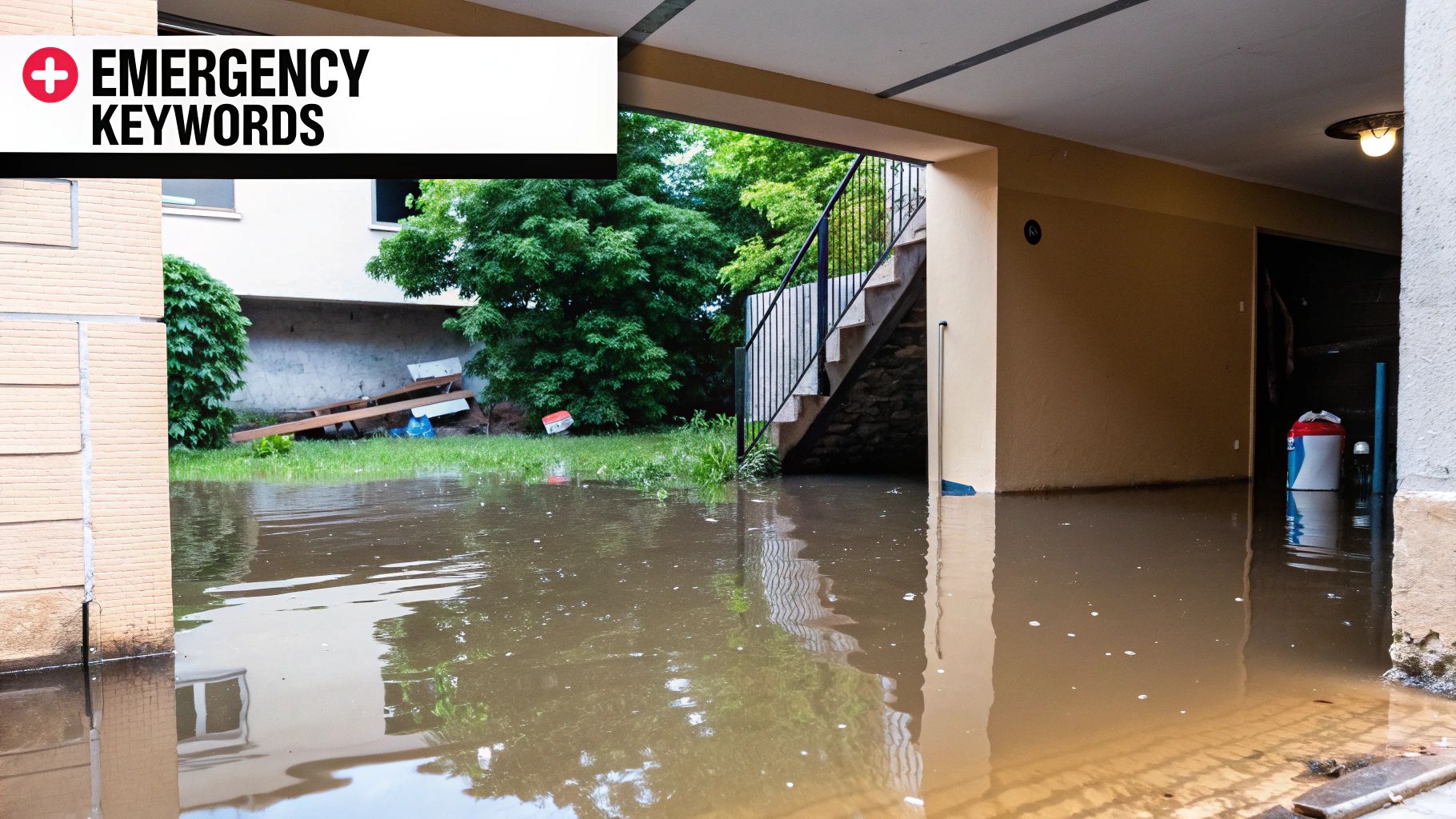
This is the difference between getting useless clicks and landing profitable emergency jobs.
Think Like a Panicked Homeowner
Put yourself in their shoes. A pipe just burst. Their searches will be short, direct, and local.
Forget broad terms like "water damage." Get hyper-specific with keywords that generate calls:
- Service + Location: "Basement flood cleanup in Chicago"
- Emergency + Service: "24/hour water extraction"
- Problem + Location: "Sewage backup help Lincoln Park"
- "Near Me" Modifiers: "Water mitigation companies near me"
These longer phrases, called long-tail keywords, get fewer searches but have a much higher conversion rate. The person searching for them is ready to hire.
The U.S. restoration market is projected to hit $7.1 billion by 2025. Competition is tough, with about 20% of remodeling contractors focusing on water damage. You can find more restoration industry statistics online. A focused keyword strategy is how you compete.
How do I find keywords for my restoration business?
You don't need expensive software. Google itself tells you what people are searching for.
Look at the "People Also Ask" (PAA) box. Type in a core term like "flooded basement" and scroll down. Google will show you related questions people are asking.
Pro Tip: The "People Also Ask" section shows your customer's biggest worries. Use these questions for website pages, blog posts, and FAQs.
For instance, you'll see questions like:
- How much does it cost to extract water from a basement?
- Can a flooded basement be fixed?
- What is the first thing to do when your basement floods?
Answering these questions on your website builds trust and helps you rank for those exact phrases.
Build Your Core Keyword List
Let's put this into action. Brainstorm all the services you offer. Combine them with every city and neighborhood you serve.
Your Core Keyword List Should Include:
- Urgency Words: Use terms like "emergency," "24/7," "immediate," and "fast." For example, "emergency burst pipe cleanup."
- Problem-Specific Phrases: Be specific. "Burst pipe cleanup," "sump pump failure restoration," and "sewage backup removal" attract leads who know their problem.
- Location, Location, Location: Always add city names and neighborhoods. "Water damage repair Brooklyn" is better than just "water damage repair."
When your keyword list uses urgency and location, your website speaks the same language as someone in a crisis. This makes you the obvious choice.
Build a Website That Converts Panic into a Phone Call
When a basement is flooding, customers aren't admiring your web design. They are in crisis mode. Your website needs to get them to call you, now.
This means your site must be efficient. Forget clutter. Your phone number needs to be huge and at the top of every page. In the world of SEO for water damage restoration, a hard-to-find phone number is a lost job.
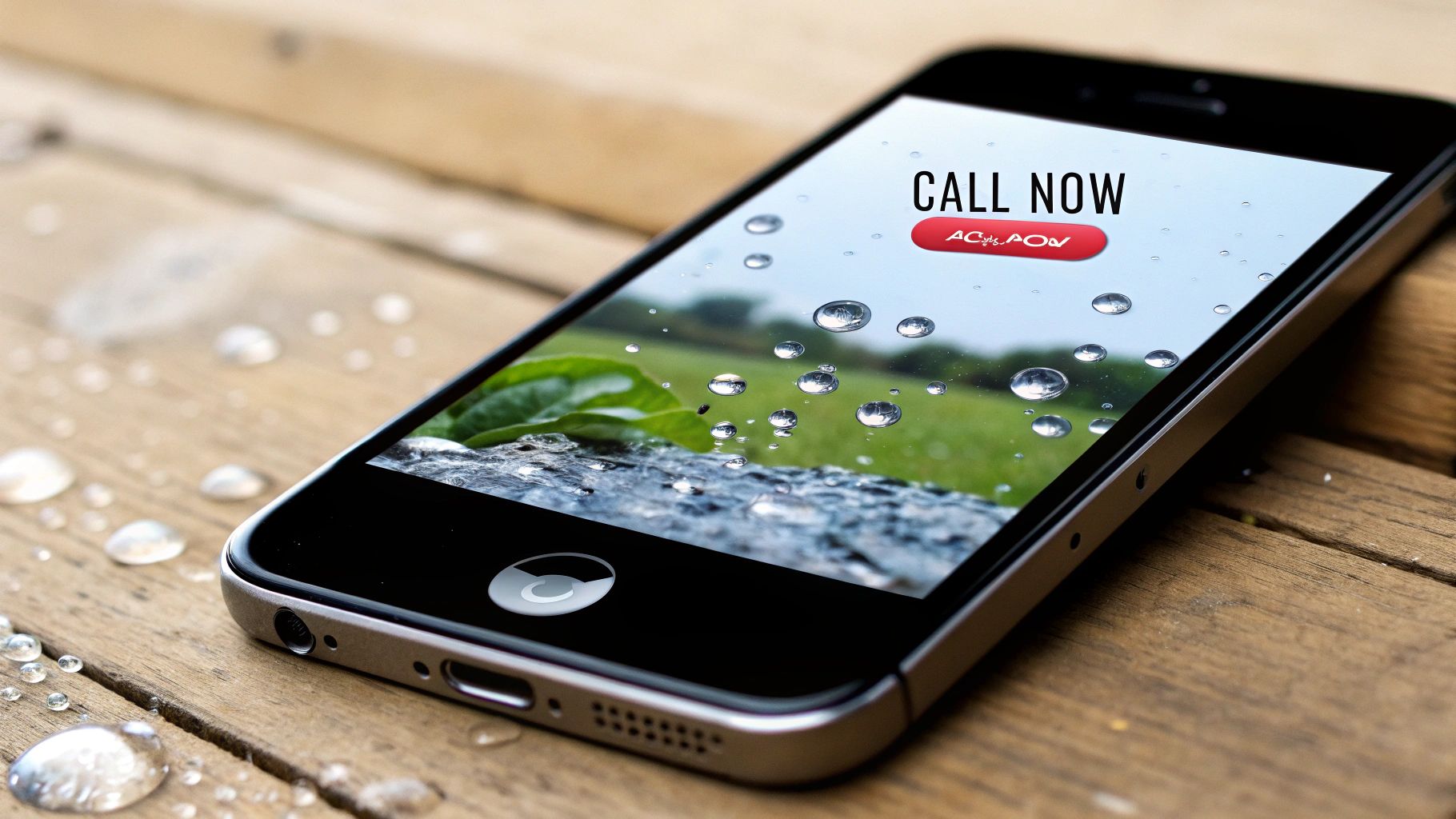
Mobile-First Is a Rule
Your customers are likely on their phones, standing in water. If your website is slow or hard to use on a mobile device, they will leave and call your competitor.
Your site must be mobile-responsive.
- Buttons have to be big. Make the "Call Now" button easy to tap.
- Forms need to be short. Only ask for a name, number, and problem.
- Text must be clear. It should be easy to read without zooming.
We have a complete guide that shows you how to build a mobile landing page that gets results.
The Bottom Line: Your mobile website is everything. A clunky mobile experience is like a busy signal on your emergency line.
City-Specific Service Pages Are Your Secret Weapon
A single homepage isn't enough to dominate local search. You need dedicated service pages for every city and town you cover.
A page titled "Water Damage Restoration" is okay. A page titled "Basement Flood Cleanup in Springfield" is a magnet for local traffic.
These pages prove to Google and customers that you are a true local expert. They are the backbone of a strong on-page SEO strategy.
Must-Have Checklist for Local Service Pages
Use this checklist to make sure every service page is built to rank and convert.
| Website Element | How to Optimize It | Why It Works |
|---|---|---|
| Hyper-Local Title | Include the city name and service in the page title and H1 heading (e.g., "Emergency Water Extraction in Oak Park"). | This tells Google and users the page is highly relevant to that specific location and need. |
| Visible Contact Info | Place your phone number and a contact form at the top of the page. | Panicked customers won't hunt for a way to call. This removes friction and boosts calls. |
| Local Social Proof | Embed 1-2 customer reviews from people in that specific town. | Seeing a neighbor's positive review builds instant trust and makes calling easier. |
| Embedded Google Map | Add a Google Map showing your service area. | This is a visual signal to Google that you are a legitimate local business. |
| Unique Local Content | Mention a local landmark or neighborhood to show you know the area. | This proves authenticity and helps Google see the page as uniquely valuable to that location. |
Running through this list for every city page is a game-changer.
The demand for restoration services is growing. The U.S. sees about 20 billion-dollar disasters annually. This has fueled the growth of over 35,000 restoration businesses. Creating dedicated local pages is how you capture your share of that market.
Building Unshakeable Local Trust
When a pipe bursts at 2 AM, homeowners call the first company that looks trustworthy. For a local business, that trust is gold.
You build trust online by proving you're a real, local operation with a great reputation backed by customer reviews.
Nailing these two elements is central to any SEO for water damage restoration strategy that works.
Get Your Local Citations in Order
A citation is any online mention of your business's Name, Address, and Phone number (NAP). You find them on sites like Yelp, Angi, and the Better Business Bureau (BBB).
Google checks these directories to verify your information. When your NAP is consistent everywhere, it sends a massive trust signal to Google, boosting your local rankings.
If one directory lists you as "123 Main St" and another has "123 Main Street," it creates confusion. Consistency is everything.
Bottom Line: Inconsistent NAP information is a major red flag for Google. It can hurt your ability to show up in local search results.
Start by manually claiming and updating your listings on major directories. Then, look for niche directories for home services or your city.
How do you get good reviews for a restoration company?
The secret is to make it easy for a happy customer to leave feedback when they feel most grateful. That moment is right after the job is finished.
Here's a simple way to do it:
- Ask for a Quick Gut-Check: As your crew finishes, the lead tech should ask, "Are you completely happy with how everything turned out?"
- Send the Link: Once they say yes, follow up with, "That's great! Would you mind if I sent a quick text with a link to leave us a Google review? It really helps other local families find us."
Then, send a text like this:
"Hi [Customer Name], it's [Your Name] from [Your Company]. We were glad we could help today. If you have a moment, would you mind sharing your experience on Google? It helps other homeowners find us in an emergency. [Direct Link to GBP Review Page]"
This approach is personal, timely, and removes all friction.
Why Do Online Reviews Matter?
Online reviews are today's word-of-mouth. Research shows 75% of consumers look up a business online before contacting them. A steady flow of recent, positive reviews is a powerful trust signal for customers and Google.
Respond to Every. Single. Review.
Most of your competitors drop the ball here. Responding to all reviews—good and bad—shows you are engaged and care about your customers.
- For the good ones: Thank the customer by name. Mention a specific detail from their job.
- For the tough ones: Stay professional. Acknowledge their frustration, apologize, and offer to take the conversation offline to make it right.
Potential customers read your responses. Seeing you handle criticism gracefully can be more convincing than another 5-star review.
Creating Smart Content That Makes You the Go-To Expert
Let's move beyond your main service pages. How do you show you’re the leading authority on water damage in your area? By creating content that genuinely helps people and answers their questions during a disaster.
Think about the panicked questions you get on calls every day. That's content gold. A blog post on "What to Do in the First 30 Minutes After a Flood" will resonate more than a generic "About Us" page.
Answer the Questions They're Actually Asking
Your content needs to address a property owner's biggest worries. When you provide clear answers, you become a trusted resource.
Here are examples of real questions you can turn into blog posts:
- How much does it cost to fix water damage? Write an article breaking down the factors, like water type and materials involved. People appreciate transparency.
- Is my hardwood floor ruined after a leak? A guide helping someone identify a salvageable floor shows you're an honest expert.
- What is the first thing to do when your basement floods? A simple, step-by-step checklist can be a lifesaver for someone in a panic.
When you focus on these longer search queries (long-tail keywords), you connect with people actively seeking solutions.
Build Authority with Real-World Partnerships
Here’s a piece of SEO for water damage restoration that most companies miss: building relationships that earn you powerful backlinks. A backlink is like a vote of confidence from another website. Google sees these "votes" and rewards you.
Key Insight: The best links come from real, professional relationships with other local businesses who trust you.
Focus on building a referral network with people who are first on the scene.
Your Local Link-Building Hit List:
- Plumbers: They deal with burst pipes daily. A solid partnership means they’ll send clients your way.
- Insurance Agents: When a homeowner makes a claim, they talk to their agent first. Getting on an agent’s preferred vendor list provides a steady stream of jobs.
- Roofing Companies: A leaky roof is a common cause of water damage. Build a two-way referral relationship with a good local roofer.
This isn't just for SEO; it's good business. These partnerships drive referrals and create the high-authority backlinks that Google loves.
Frequently Asked Questions About Restoration SEO
If you're busy running a restoration business, digital marketing can feel overwhelming. Most owners have the same questions about how SEO for water damage restoration really works.
Let's get you some straight answers.
How Long Does It Take for SEO to Start Working?
This is the big one. While you can see quick wins from tuning up your Google Business Profile in a few weeks, true SEO is a marathon, not a sprint.
You should plan on seeing significant movement within 4 to 6 months. The work you do in the first few months builds momentum that turns into a consistent stream of emergency calls.
The bottom line: SEO is like building a good reputation. It doesn't happen overnight, but once you have it, it's a powerful asset for getting new business.
Can I Do SEO Myself or Should I Hire Someone?
You can definitely handle some basics on your own. Claiming your Google Business Profile, taking photos of your team, and asking for reviews are high-impact tasks you can manage.
But for more technical work—keyword research, building service pages, and earning backlinks—a specialist who knows restoration marketing can make a huge difference. Hiring an expert lets you focus on your crews while they build a strategy that works.
What Is More Important: Local SEO or Regular SEO?
For a water damage company, local SEO is everything. Your customers are searching for immediate help "near me."
Your entire focus needs to be on dominating the local map pack and ranking for searches in your specific service areas. The goal is to be the first call for every homeowner and property manager in your area.
Ready to make your phone ring with exclusive, high-intent water damage leads? At Clicks Geek, we build customized SEO and Google Ads strategies that put your business in front of customers the moment they need you. Stop buying shared leads and start owning your market today!
Is Your Business Ranking in Google Maps?
Turn Google Maps into a Lead Engine w/ Clicks Geek’s AI-powered local SEO. 3,000+ clients served. Our proprietary, fully done-for-you Maps SEO system handles everything—keyword targeting, local optimization, content, reviews, and ranking strategy—automatically.


